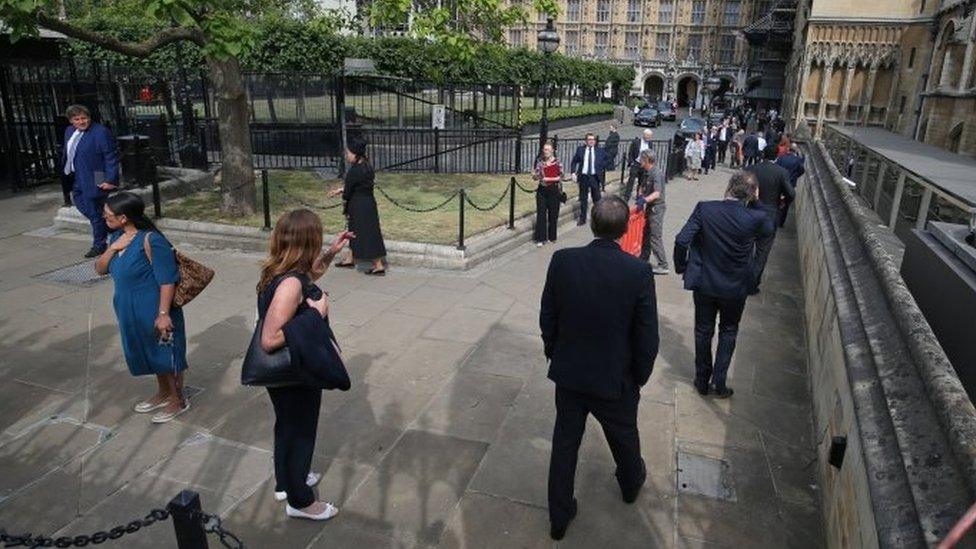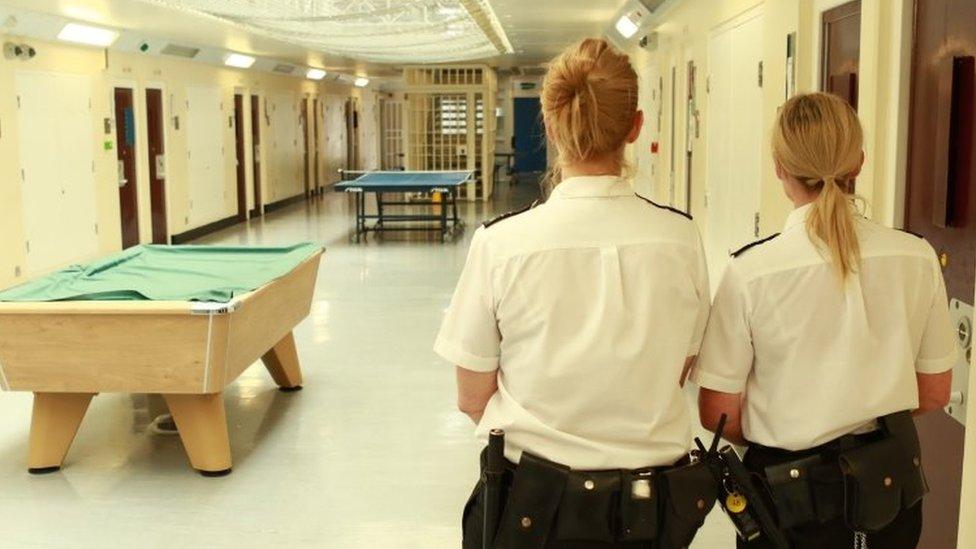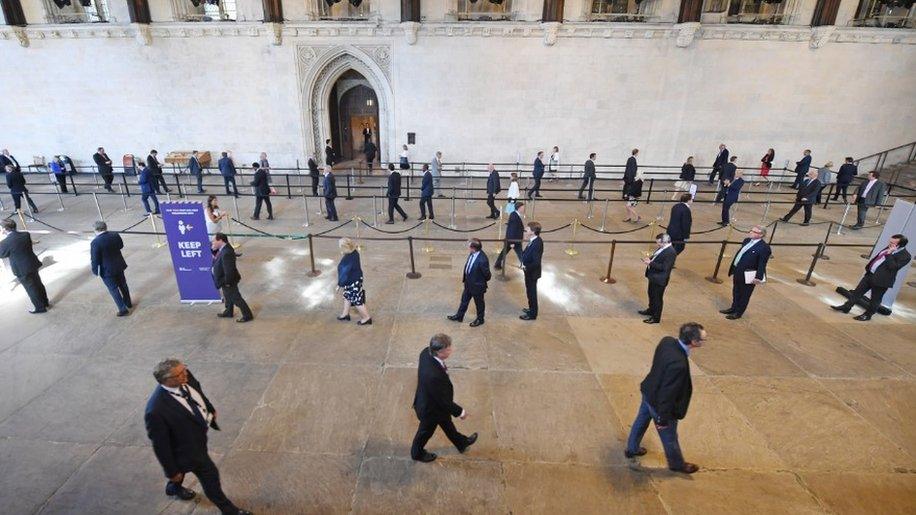The week ahead in Parliament
- Published

Is queuing the way of the future? Many MPs hope not
Parliament's new normal is still not very normal. True, bill committees are back, with the Finance Bill, the Domestic Abuse Bill and the Immigration Bill among those under detailed scrutiny in the larger committee rooms, where social distancing is possible.
This week also sees the return of Ten Minute Rule bills, with a couple of interesting legislative proposals on regulating London pedicabs and on local energy. These are often put down more to make a point than in any serious hope that they will become legislation, but it has happened in living memory.
The not-normal bit is voting. They can't vote at all in the House of Lords, which means that the. Most significant phases of Lords proceedings, Report Stage consideration of bills, where amendments are often made, and where the government sometimes loses, are not happening, and probably won't happen till September.
The Commons does have a voting procedure, but it is so unwieldy that most MPs loath it, and the 40-plus minutes of queuing round the Parliamentary Estate involved - which is why Monday will see an emergency debate on the conduct of proceedings, and quite possibly further attempts to bring back the online voting system.
As usual during the pandemic, some of the most significant events will be ministerial statements or urgent questions, dropped into the schedule at a few hours' notice.
And watch out for another new trend - urgent select committee pressure on pandemic-related issues. The Transport Committee is rushing out its report on aviation to get in ahead of BA's consultation on proposed redundancies. Committee Chair Huw Merriman has already raised this on the floor of the House and the report may provide an opportunity to do so again.
Here's my rundown of the week ahead:
Monday 8 June
MPs open (14:30) with Home Office Questions, doubtless to be followed by a crop of urgent questions and ministerial statements.
The day's main legislative business is the Second Reading of the Divorce, Dissolution and Separation Bill, which provides for no-fault divorce on the argument that the current process is adversarial and accusatorial and promotes conflict between divorcing parties, because the person seeking a divorce has to demonstrate their spouse has committed adultery or behaved in such a way that they cannot reasonably be expected to live with them (unreasonable behaviour) or that their spouse has deserted them for at least two years.
The bill has already been through the Lords.
Alistair Carmichael's emergency debate on the conduct of Commons business during the pandemic will be fitted in somewhere in the agenda - and judging by the series of attacks on then Leader of the House, Jacob Rees Mogg, during business questions, this could be a lively occasion.
The adjournment debate, led by Lib Dem constitutional reform spokesperson Wendy Chamberlain, is on the case for electoral reform - earlier this year she challenged Labour leadership candidates to support moving to a proportional representation electoral system.

On the Committee Corridor, there's a Human Rights evidence session (14:00) on the government's response to Covid-19, with witnesses supported by Children Heard and Seen, which supports children whose parents are in prison, followed by Justice Minister Lucy Frazer and officials from the Prison and Probation Service. Has the lockdown made things worse for the families affected?
The Housing, Communities and Local Government Committee (14:30) takes evidence from Housing Minister Christopher Pincher, as part of its inquiry into the long-term delivery of social and affordable rented housing. The committee will also hear from Tom Copley, Deputy Mayor for Housing and Residential Development at the Greater London Authority, and Nick Walkley, chief executive of Homes England.
With 90,000 new social rented homes promised every year, and only 6,200 built in 2019, the committee will examine the government's strategy and consider whether changes to the Right to Buy rules are needed.
In the Lords (14:30) questions to ministers cover changes to the planning system as a result of the pandemic, the impact of Covid-19 on the sustainability of pre-schooling and government action to promote press freedom and the safety of journalists globally.
The peers rattle through a series of orders and regulations, starting with the Draft Water Industry (Specified Infrastructure Projects) (English Undertakers) (Amendment) Regulations 2020 which deals with the regulation around infrastructure providers in England.
That is followed by the Draft Crown Court (Recording and Broadcasting) Order 2020, which will allow the recording and broadcast of sentencing remarks made by specified judges in the Crown Court (in England). Only the judge will be filmed and normal reporting restrictions will continue to apply to protect victims or witnesses.
Then comes the Draft Court of Appeal (Recording and Broadcasting) (Amendment) Order 2020, which will allow the broadcasting of judgments and advocates' arguments in family cases in the Court of Appeal. This will allow the public to see what happens in court and to hear decisions in the judges' own words.
Appeal cases rarely involve family members or other witnesses giving evidence in person, except where representing themselves, and safeguards are in place to protect their interests. This extends the 2013 rule change to allow judgments to be filmed and broadcast. The aim is to increase public understanding of the work of the courts.
Tuesday 9 June
The Commons opens (11:30) with Justice Questions, rescheduled from Tuesday 2 June.
Ten Minute Rule Bills are back after a pandemic hiatus, with the Conservative and former Westminster City Council Leader Nickie Aiken presenting a bill to regulate pedicabs in London. At the moment they are not covered by the regulations that cover taxis - they don't need a licence to operate and set their own prices, and they don't face checks on their roadworthiness or the ability of their drivers.
The main legislative action is the Second Reading debate for the Counter-Terrorism and Sentencing Bill, which is partly a response to the terrorist attacks at Fishmongers' Hall in the City of London and Streatham High Road. It is designed to ensure that serious and dangerous terrorism offenders will spend longer in custody, and will remove the possibility of any early release for serious and dangerous terrorist offenders, aged under and over 18, who receive an Extended Determinate Sentence.
The aim is to provide better protection for the public and more time for rehabilitation. The bill will also weaken the burden of proof for terrorism prevention and investigation measures (Tpims) to be imposed on people suspected of terrorist activity and remove the two-year cap on their use.
On the (still virtual) Committee Corridor, the Treasury Committee (09:30) continues its look at the economic impact of coronavirus with some usual suspects from think-tank land.
The Digital, Culture, Media and Sport Committee (09:30) continues taking evidence on the impact of Covid-19 on the theatre, creative industries and musicians, before hearing from Culture Minister Caroline Dinenage.
In the Lords (11:00) question time includes Labour's Lord Hunt of Kings Heath asking about Exercise Cygnus, the 2016 exercise simulating a flu pandemic, and preparations for responding to a major pandemic by the UK and a suggestion for a public wealth investment fund to support businesses affected by the Covid-19 pandemic.
Peers then turn to the emergency legislation passed by the Commons the previous week, with the Second Reading of the Corporate Insolvency and Governance Bill.
Wednesday 10 June
MPs begin (11:30) with half an hour of International Development questions, followed (at 12:00) by Prime Minister's Question Time.

The day's Ten Minute Rule Bill, from Conservative Peter Aldous, would allow local renewable energy companies to sell locally generated clean energy directly to customers by establishing a statutory right to local supply. The crucial detail would be to ensure that the set-up and running costs would be proportionate to the scale of their business, which would help local providers to be financially viable.
Then MPs will be asked to approve a mixed bag of statutory instruments - motions to approve statutory instruments including the Court of Appeal (recording and broadcasting) (amendment) order and the water industry (specified infrastructure projects) (English undertakers) (amendment) regulations, which were debated in the Lords on Monday.
They will also consider the Civil aviation (insurance) (amendment) (EU exit) regulations - which transfer powers to powers amend the minimum insurance requirements from the EU Commission to the UK Secretary of State.
Motion relating to the adoption and children (coronavirus) (amendment) regulations - a measure "prayed against" by Labour. They are a temporary measure for the pandemic, to amend 10 sets of children's social care regulations, affecting local authorities, children's homes, fostering services, adoption agencies and Ofsted inspections.
The aim is to provide more flexibility in meeting legal obligations, easing administrative burdens, allowing visits and contact to take place remotely and relaxing strict timescales where possible, while maintaining safeguards. The children's rights charity Article 39 has accused the government of using the crisis to "destroy children's safeguards".
The day's adjournment debate sees the SNP's Gavin Newlands raise the issue of Rolls Royce redundancies.
On the Committee Corridor, Home Affairs (09:30) continues to hear evidence on Home Office preparedness for Covid-19, and the Committee on the Future Relationship with the European Union (10:30) hears from academic experts about the progress of the negotiations with the EU.
The Women and Equalities Committee (14:30) hears evidence about the impact of Coronavirus on people with protected characteristics.
In the Lords (11:00) questions to ministers range across a call from the Bishop of Worcester for the G20 countries to cancel any debt owed to them by the poorest countries to the impact of cancelled medical operations due to the Covid-19 pandemic
The main legislating is the Second Reading of the Agriculture Bill, which creates a new farm support system for England.
It's a measure which could well be amended in the Lords, which has previously passed amendments to other legislation, aimed at issues like food safety. In particular, when peers debated earlier versions of the Trade Bill in the 2017-19 Parliament, they added requirements that there should be votes in Parliament on the mandate for any international trade negotiations and on the final result.
That was then, of course, and the arithmetic of the House of Lords may have changed a little in the government's favour, but this is still a problem area for the whips.
Expect Labour amendments, in due course, on food standards, (chlorinated chicken and GM soya) and on other issues like the protection of agricultural workers and environmental protection. The snag is that it may be a long time before the House will be able to hold votes - arrangements for online voting are not expected to be in place until September, by which time there could be quite a backlog of contested business.
The Lords Constitution Committee (10:00) quizzes the former Lord Chief Justice, Lord Judge and the Lib Dems' Baroness Walmsley on the constitutional implications of Covid-19
Thursday 11 June
The Commons day opens (09:30) with questions to the Chancellor of the Duchy of Lancaster and Minister for the Cabinet Office, AKA Michael Gove. That is followed by the weekly Business Statement from the Leader of the House, Jacob Rees-Mogg.
After that MPs polish off the remaining stages of consideration for the Birmingham Commonwealth Games Bill (already passed by the Lords) which sets out a legal framework for the games.
On the Committee Corridor, Scottish Affairs (14:30) takes evidence on Coronavirus and Scotland from Jeane Freeman, the Scottish Government Cabinet Secretary for Health and Sport, and Professor Jason Leitch, Clinical Director of Healthcare Quality and Strategy.
A key area o questioning will be the diverging approaches of the UK and Scottish governments. And the Petitions Committee (14:30) considers public petitions on the Government's response to Coronavirus - the committee says it has seen "unprecedented levels of engagement" on issues around maternal mental health, childcare and maternity leave.
In the Lords (11:00) Lib Dem Lord Clement-Jones has a question on research by the British Board of Film Classification on the exposure of children and teens to harmful or upsetting content while in lockdown, and Labour former cabinet minister Lord Hain asks about protecting personal privacy in the trial on the Isle of Wight of the NHSX Covid-19 contact-tracing application.
The day's main debates are on subjects chosen by backbench peers. First Baroness Hayman leads a debate on the case for post-Covid-19 recovery strategies that will contribute to a fairer, cleaner, and more sustainable economy, then Lord Campbell-Savours raises the government advice on the wearing of masks in public.
Friday 12 June
This was supposed to be the much-postponed start of the Commons Private Members' Bill season, with the Labour MP Anna McMorrin's Co-operative and Community Benefit Societies (Environmentally Sustainable Investment) Bill due for Second Reading, followed by Alex Cunningham's Unpaid Work Experience (Prohibition) (No. 2) Bill, and then by Peter Bone's Hospitals (Parking Charges and Business Rates) Bill.
But the government wants to put all this back to 11 September, and may well have succeeded in doing so by Friday.
- Published3 June 2020

- Published2 June 2020
